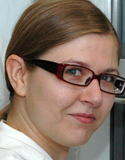Contact

Dr. Julia Vierheilig
vierheilig@microbial-ecology.net Division of Microbial Ecology (DOME), Department of Microbiology and Ecosystem Science, University of Vienna,
Althanstraße 14, 1090 Vienna, Austria
Publications
Vierheilig, J., Savio, D., Ley, R. E., Mach, R. L., Farnleitner, A. H., Reischer, G. H. (2015) Potential applications of next generation DNA sequencing of 16S rRNA gene amplicons in microbial water quality monitoring, Water Science and Technology, 72(11): 1962-1972
Vierheilig, J., Frick, C., Mayer, R.E., Kirschner, A.K.T., Reischer, G.H., Derx, J., Mach, R.L., Sommer, R. and Farnleitner, A.H. (2013) Clostridium perfringens Is Not Suitable for the Indication of Fecal Pollution from Ruminant Wildlife but Is Associated with Excreta from Nonherbivorous Animals and Human Sewage. Applied and Environmental Microbiology. 79(16): 5089-5092.
»More publications
People ›Alumni
Julia Vierheilig
Research Interests
• Environmental Protection
• Biotechnology
• Applied Microbiology
• Microbial Ecology
• Microbial hazards and risk assessment
Julia´s interests lie in the field of water resource research because of the enormous importance of water to life. In the light of the constantly growing population on earth, the treatment of water resources and their protection become ever more important. Julia is fascinated by microorganisms because they play important roles in aquatic ecosystems as they do on the whole planet. Despite their small size, they have large effects on the cycling of nutrients and compounds due to the extremely high numbers in which they occur in virtually every niche on earth.
Key Facts
Julia studied Biology at the University of Wuerzburg, where she passed her “Diplom” examination in June 2009 with the over-all grade of “very good”. The topic of her “Diplom” thesis, supervised by Prof. Dr. Dr. h.c. mult. Roland Benz (Biotechnology), was “Phylogenetic and physiological characterization of sulphamethoxazol degrading microorganisms in wastewater.” It was involved in an interdisciplinary research project between the TU Munich and the Bavarian Environment Agency. Julia specialised in Zoology, Animal Ecology and Tropical Biology as her major subjects and Biotechnology and Pharmacognosy as minor subjects during her studies. She also took an additional subject: Biochemistry. Julia has spent time conducting research in Malaysia under the supervision of Dr. Frank Wiens on questions about human alcoholism. Julia has always has been interested in interdisciplinary research and has taken courses in many different research fields during her studies such as bioinformatics, human genetics, botany and GIS.
Julia graduated from the Vienna Doctoral Programme in March 2014 with distinction and was awarded the academic degree “Dr. rer. nat.” (“Doctor rerum naturalium”, equivalent to “Doctor of Science”). Her PhD thesis in aquatic microbiology, supervised by Assoc.-Prof. Dr. Andreas Farnleitner, Dr. Georg Reischer) was about “Bacteroidetes and other alternative bacterial indicators for faecal pollution analysis of water: applicability, population structures, and dynamics”. Her work was realised in the frame of the Interuniversity Cooperation Centre Water and Health (www.waterandhealth.at) and within the research project “Groundwater Resource Systems Vienna” in cooperation with Vienna Water (MA31), as part of the project LE 07-13 “Gewässervernetzung (Neue) Donau–Untere Lobau (Nationalpark Donau-Auen)” funded by the Government of Austria (Federal Ministry of Agriculture, Forestry, Environment & Water Management), the Government of Vienna, and the European Agricultural Fund for Rural Development. During her PhD studies, she spend 3 months in the research group of Assoc.-Prof. Dr. Ruth Ley in the Department of Microbiology at the Cornell University in Ithaca (New York, USA) to improve her bioinformatic analysis skills and examine the potential of next generation sequencing methods to distinguish between different intestinal and non-intestinal bacterial communities. She also joined the research group of Dr. Christian Griebler in the Institute of Groundwater Ecology at the Helmholtz Centre Munich, German Research Centre for Environmental Health in Neuherberg (Germany) as a visiting fellow for 3 months. The Institute of Groundwater Ecology studies the beneficial functions of groundwater ecosystems, which maintain the quality of our drinking water and was therefore of special interest for her research.
Currently she is employed within the ERC advanced grant “NITRICARE – Nitrification Reloaded – a Single Cell Approach” of Prof. Dr. Dr. h.c. Michael Wagner in the Division of Microbial Ecology at the University of Vienna. Her research deals with ammonia-oxidizing microorganisms in different water resources. The aerobic oxidation of ammonia to nitrite is the first step of nitrification, which is a central component of the Earth´s biogeochemical nitrogen cycle. The activities of the involved microorganisms (bacteria and archaea) are of major ecological and economic importance and affect global warming, agriculture, wastewater treatment, and eutrophication. The aim of her work is to contribute to a comprehensive basic understanding of the identity, evolution, metabolism, and ecological importance of those bacteria and archaea that actually catalyse nitrification in nature. For this purpose innovative single cell technologies like Raman-microspectroscopy and single cell genomics will be combined in novel ways. Application of these approaches will reveal the evolutionary history and metabolic versatility of uncultured ammonia-oxidizing microorganisms and will provide important insights into their population structure. Together, the genomic, metabolic, eco-physiological and genetic data will provide unprecedented insights into the biology of nitrifying microbes and open new conceptual horizons for the study of microbes in their natural environments.
